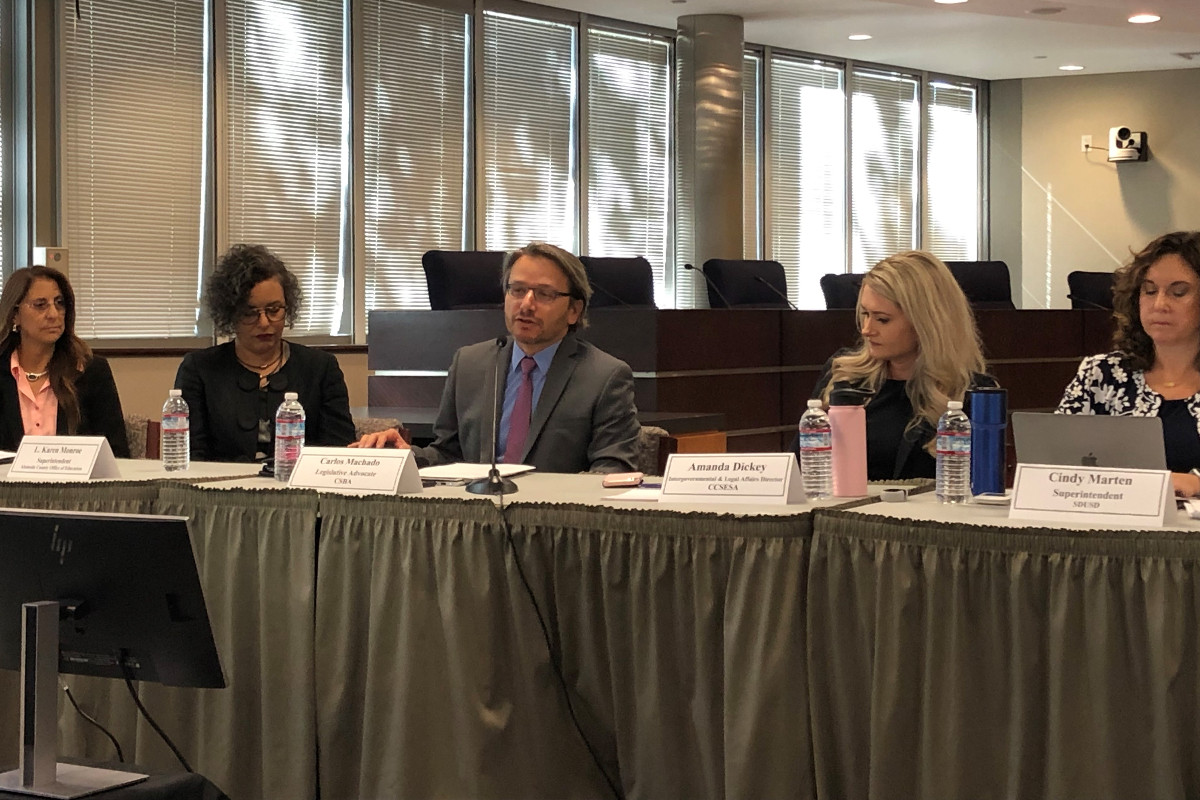Representatives from school districts, county offices of education and education organizations gathered in Sacramento on June 26 for a California Department of Education panel discussion, Best Practices for Charter School Authorization and Renewal. The panel, which included CSBA Legislative Advocate Carlos Machado, convened at a key moment for California’s charter schools amid the recent release of reform recommendations from a state-appointed task force and as several bills regarding enrollment policies, petition appeals and charter locations make their way through the Legislature.
Just one in three of California’s 1,000 districts has a charter school within its boundaries, and of those, 90 percent have fewer than five. Only the largest authorizers have staff dedicated to the oversight of charter schools. The panelists agreed that with so much variation in district size and capacity, the most important needs for authorizers are guidance, training and support.
With the current lack of standards available at a statewide level, several panelists recommended focusing on developing internal processes for reviewing charter school petitions and for future oversight. “Be prepared,” said Machado. “It’s best to have policies and practices in place before you get your first petition.” He emphasized the importance of setting expectations early — both so the petitioner knows what to expect and the governing board and staff are clear on the process and the timelines. CSBA’s own Charter School Taskforce issued a report last fall with both practice and legislative recommendations that can be a valuable resource for charter school authorizers.
Best practices
San Diego Unified School District is the second largest authorizer of charter schools in the state, after Los Angeles Unified. Deidre Walsh, director of the district’s Charter Schools Office, outlined the district’s best practices in both authorization and oversight. She explained that each new charter petition is distributed for review to different departments with experts in various fields, such as curriculum and finance, who then provide feedback.
San Diego also has a Charter Advisory Group made up of charter leaders in the district that helps to provide perspective from the charter management side. Walsh emphasized that a critical component of the district’s authorization process is capacity interviews with the petitioners to ensure they are knowledgeable about the academic and operational program they are proposing.
On the oversight side, Walsh highlighted the importance of district officials requesting financial, academic and operational documents for periodic review in addition to charter school Local Control and Accountability Plans. Beyond that, San Diego USD makes sure to conduct full-day annual visits to each charter school after it has reviewed the school’s submitted documents. Once there, district staff conducts interviews with a wide sampling of school stakeholders, including teachers, financial representatives, school leaders, board members, students and parents. “That gives us a snapshot of what that school is looking like from every perspective,” she said.
Challenges for smaller districts
“Now just imagine everything what [San Diego USD is doing] in a district that doesn’t have a dedicated charter school office,” said Stephanie Farland, founder of the consulting firm Collaborative Solutions for Charter Authorizers. As she commended San Diego USD’s work, Farland said that there need to be rubrics and “vetted, thorough and consistent” petition review and oversight standards available statewide to make the work of effective authorizing and overseeing charter schools more attainable for smaller districts.
Teresa Kapellas from the Alameda County Office of Education’s Charter Authorizers Regional Support Network (CARSNet) said that, at a minimum, charter school oversight relies on a memorandum of understanding that sets clear expectations, site visits at least once a year, fiscal and LCAP compliance document review and always providing written feedback from all reviews. She said that improving on the minimum requirements includes multiple site visits each year, an annual report on charter school status to the authorizing board and regular meetings with charter leadership.
Considering the amount of work that goes into both authorization and management, CSBA’s Machado pointed out that, for most districts, this is often one task among many for staff and is an indication that the 1 percent oversight fee that districts incur for charter schools is not enough. “More should be dedicated to ensure there is proper administrative oversight. It is critical for those staff to be in communication with the governing board — not just so that the governing board knows what the issues are, but so that the community is aware also. It’s part of a process, so it’s not a surprise when tough decisions are made around renewal time.”
Renewals
In a discussion of renewals, it was stated that Education Code currently uses academic performance as the most important factor. Panelists agreed that, while it is one of the most important factors, academic performance alone cannot be the determinate factor for renewal. Alameda COE Superintendent L. Karen Monroe said fiscal oversight is interconnected with academic performance and both must be considered. “Particularly in this era of LCAP and LCFF, we have spent a lot of time as a state joining those priorities and understanding that if you don’t have the fiscal capacity to fund your vision for student achievement, then that vision is going to be limited.”
Other topics touched on by the panel included the need to update the Ed Code for charter school oversight (current Education Code still references the state Academic Performance Index, which is no longer used and has been replaced by the California Schools Dashboard) and the different authorization and approval processes that should be required for a charter management organization-run school as opposed to a single charter school.
CSBA resources regarding charter schools, including the task force report, governance briefs and sample policies can be found at www.csba.org/charterschools.





